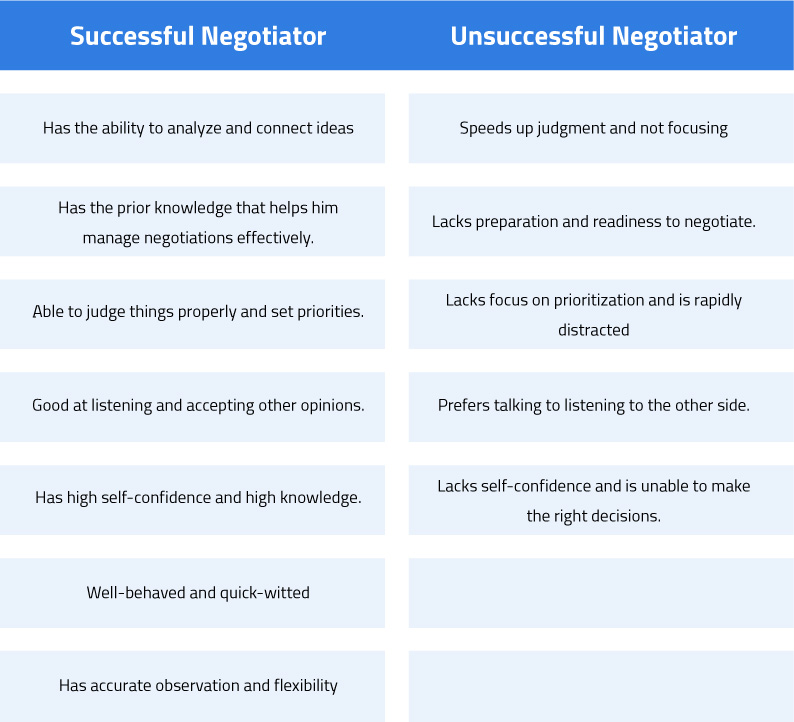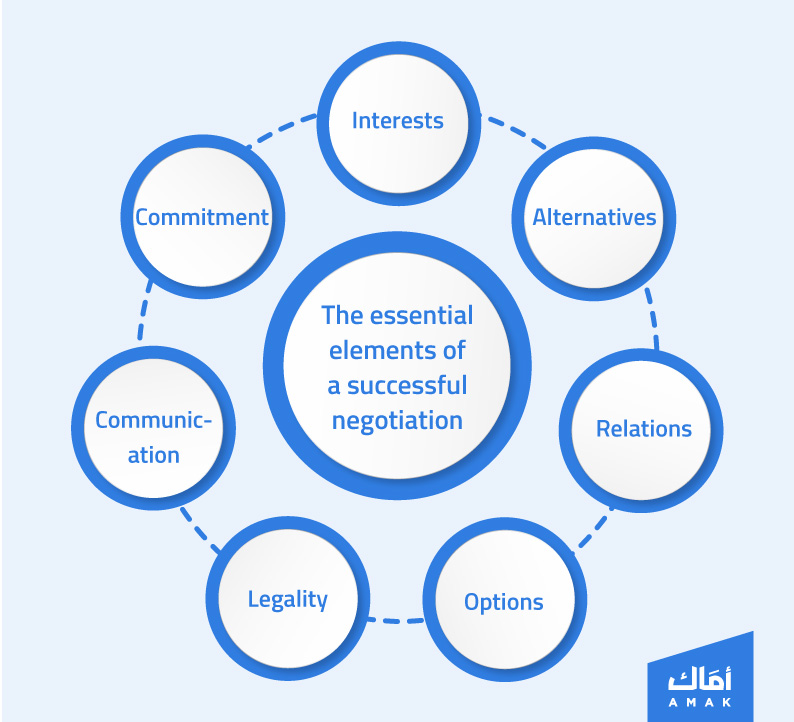
The business world of the 21st century requires soft skills, such as effective communication and storytelling skills through attractive presentations, innovation and benefit-sharing through creative negotiation. Whether you are a start-up entrepreneur or trying to improve your career, these skills are no less important than the technical skills needed by any start-up project or any company seeking to build work teams capable of completing deals, building partnerships and relationships outside the company’s fences on the one hand, and effectively negotiating internally between each other on the other hand.
Whether you are a professional negotiator or still at the beginning of your career as a professional negotiator, in this article (which will be the introduction to a series of upcoming articles), you will find technical information, practical tools, and cumulative experience which will enhance your negotiation skills through the theoretical knowledge that we will present, and analyzing realistic negotiating situations reinforced by videos posted on our YouTube channel. They move you from good negotiators’ class to creative negotiators’ class, capable of devising innovative solutions for zero-sum negotiations, skilful in dealing with the atmosphere of anger and tension, even hypocrisy, lying and pressure that can be exerted on us from other parties. Initially, we must build common ground by agreeing to define some terms and correct some common mistakes.
The Concept of the Negotiation Process
The negotiation process can be defined as building trust between the negotiating parties, in conjunction with creating a set of benefits and gains to be shared between those parties.
From this definition, we find that for the success of any negotiation process, the negotiator must realize two important points:
1- Value
It is necessary to define the set of benefits we are interested in and what benefits the second party is looking for from this negotiation process. The benefit is not necessarily the material value gained from any business transaction. For example, if you are negotiating with a company’s purchasing manager, the benefit he is looking for maybe a fast delivery time, as a result of the immediate need for the materials he wants to buy or payment facilities because of his current liquidity shortage. In return, the benefit you seek from this negotiation process after agreeing on the price may be a guarantee of payment. In case you provide him with such payment facilities, you negotiate the opening of bank credit or receiving post-dated cheques, as you aim to agree with him on a payment mechanism that makes you feel comfortable and secure that your right is guaranteed after supplying the materials or providing the service to him.
But if you are an employee negotiating with the Human Resources Manager in a new company interested in you joining its team, you negotiate with them in addition to the salary on bonuses and the percentage of sale and collection, the job title that you will get, the number of annual leave days, the number of working hours monthly, or the flexibility to work without the need for a daily presence in the workplace. After agreeing on all of this, you may negotiate with the senior management on the powers that you have to achieve the required accomplishment, your right to choose the work team, buy the software you used to work on, or any other tools you deem necessary to build your cumulative career success. Thus, we see that value does not only mean the material value of what we negotiate but rather goes beyond to include any benefit that increases our happiness and satisfaction and raises our quality of life.
2- Differentiation between the concepts of negotiation and bargaining
Before entering into negotiations, it is necessary to distinguish between the concepts of negotiation and bargaining. Bargaining depends on the principle of meeting in the middle between the two negotiation parties (we divide the threshing floor between us equally), as is the case in most popular bazaars and markets, where bargaining starts from a high number is requested by the seller to gradually drop it to the number the buyer has offered and eventually agree to share the difference to complete the deal. However, negotiation is based on understanding the benefits needed by the negotiating parties, analyzing their negotiating situation by knowing their available alternatives, guessing the area of common benefit between them, devising and exchanging additional benefits, and paying attention to formulating the appropriate offer to market it internally and face-saving. From here, we see that negotiation is a systematic and sequenced process, strategically planned and implemented tactically, and accumulating results across multiple phases that may last for several days or years.
How to Build Negotiation Confidence between the Negotiating
Parties
To succeed in the negotiation process, from the beginning, think about how you will build trust with whom you will negotiate. This confidence comes from a good understanding of the other party, identifying his priorities and the things he seeks. Therefore, get to know your negotiator well before negotiating with him, then build your negotiation plan and include solutions and proposals that meet these goals, consistent with your objectives from the negotiating process.

Building the Negotiation Strategy
You need to have a clear map to reach an agreement that meets your goals. The following steps are the most critical steps you need to work on when preparing your negotiating strategy and know that your good preparation for it puts you in a position of strength during the negotiation process.
1- Set your goals
Remember to define your goals before the negotiation phase begins. Accurately define your goals from the negotiation process; the other party will not give you what you want easily; Therefore, you have to predetermine your goal and what helps you reach it.
Know well what points you can concede or negotiate and what points you cannot. Don’t limit your goals to short-term ones; also, focus on what matters to you in the long term.
If you define precisely what you want, you will be able to build solid and convincing arguments for your negotiators.
2- Conduct a thorough search
Information is a source of strength and is increasingly vital in negotiations. It identifies you with the party you are negotiating, making you better able to discuss and put forward ideas, thereby managing the dialogue and reaching the desired results.
3- Negotiate with decision-makers
Before you start negotiating, make sure to negotiate with decision-makers who have the authority and decision to implement the agreement you reach and that negotiating with them is not a waste of time. You can get to know them by searching for whom to negotiate with and collecting information about the decision-makers and the influential ones.
4- Build trust
Don’t forget to build trust with those you negotiate; Trust is the most critical factor in the success of the negotiation process. Because human beings – inherently – attach great importance to their attitudes toward others, their decisions are affected by these attitudes.
Make sure that those you negotiate with are willing to reach a Win-Win deal, and your eagerness to give what they want, and seek to achieve it. This will create bridges of trust and communication between you.

5- Combine firmness and softness
Negotiations need consistency and flexibility at the same time; Do not give up what you want, and be clear and specific about it, but always keep the door to discussion open, and present your idea in a calm manner that indicates an understanding of the other party’s desire.
6- Do not accept the first offer
Do not rush to accept the first offer made by the other party; it may not be the ideal one for you. Instead, take your time to think, study it well consider the goals you have already set and make a corresponding offer in light of your goals and needs.
Of course, it’s not a mistake to reach an agreement quickly, but it’s no harm to take your time to think about what the other party offers you, so you don’t regret your decision.
7- Think carefully about the questions you will ask
The success of the negotiations depends on the quality and kind of questions posed by the negotiating parties. Avoid closed questions answered with yes or no and ask open questions; To gain the greatest amount of information and to open a wider area for negotiation.
Pay attention to the questions you ask, as they significantly affect the outcome of the negotiation process.
8- Don’t hide your feelings
Show your feelings of what you like and don’t like about the presentations and discussions, and use body language to communicate your feelings, as it greatly influences the course of negotiations in a tactful and non-offensive manner to those you are negotiating with.
9- Keep your expectations high
Start negotiations on higher terms than you seek to reach at the end of the negotiation process, as the discussions – of course – aim to reduce the level of conditions requested during the negotiation. For this reason, starting your negotiations with high expectations is preferable to get satisfactory results anyway.
Qualities of a Successful Negotiator
We will make it easier for you to differentiate between successful and unsuccessful negotiators by comparing them and showing their strengths and weaknesses:

Successful Negotiation Skills
Negotiation skill differs from social communication skills, as negotiation focuses on achieving gains with minimal loss, and achieving this requires a set of skills you must learn and master to be a successful negotiator.
1- Effective Communication Skill
Communication skill includes the negotiator’s ability to identify and understand the other’s verbal cue, in addition to his ability to convey ideas simply, clearly and accurately.
As a negotiator, you should have the flexibility and ability to change the communication style in accordance with the listener’s desire and needs, so that there is no misunderstanding that impedes a solution to the satisfaction of all parties.
2- Listening Skill
The accomplished negotiator is best able to listen and gather the greatest amount of information about the other party, the most capable of remembering all the details and actions of the negotiator, then building his discussions and responses to suit them, and employing them to his advantage.
3- Persuasion Skill
When it comes to negotiating, your ability to influence the other party is an essential skill and a point of strength that helps you win over those you negotiate with to your side and support your point of view, and ends up reaching an agreement that satisfies you.
4- Planning Skill
This skill has a fundamental role in succeeding in the negotiation process, as it is mainly based on defining the terms of the agreement to be achieved and the steps to implement it, as well as predicting all the long-term consequences and responsibilities of all parties.
5- Emotional Intelligence Skill
Learn how to control your feelings and emotions; having the ability to control emotions is one of the basic negotiation skills. Because it increases the chances of success in the negotiation process, makes it more difficult to anticipate the counterparty’s reactions, and helps you – as a negotiator – remain calm and focused on the central issues to negotiate.
6- Problem-solving Skills:
Don’t focus only on achieving gains, but always make sure to have critical thinking, develop your problem-solving skills, and deal with unexpected matters. You are being quick-witted increases your ability to convince the other party that your goal is to achieve mutual benefit and thus reach a solution that satisfies all negotiating parties.
7- Decision-making Capacity
Negotiations may reach a stage of stalemate that requires you to make immediate and decisive decisions while simultaneously providing satisfactory solutions for all. This skill prevents the failure of the entire negotiation process that may occur due to reaching stages of sterile debate.
The Essential Elements of a Successful Negotiation
Roger Fisher, the founder of Harvard’s PON negotiation program, identified seven main components of the negotiations, ensuring a better understanding of the negotiating process and a greater capacity to manage it effectively.
Fisher noted that dealing with these components is greatly influenced by the fundamental objective of the negotiation, between the negotiation ending in Win-Win, or the negotiation ending in Zero-Som.
These factors are summarized in the following points:

1- Interests
The interest differs from the position. While the position refers to what the negotiating party wants, the interest refers to the reasons and motives behind this position. For example, to carry out a project outside your working hours for a vacation, the vacation is your position. Your interest may vary between your desire to spend time with your family or other reasons.
Remember that understanding the other party’s interests is the key to an integrated negotiation; Negotiating the position could be difficult while negotiating interests opens up debate and increases the possibility of additional interests, which makes understanding and knowing the interests before starting the negotiation process an effective negotiating tool.
2- Alternatives
Identifying interests and knowing them helps you develop alternative plans and charting paths for all possible negotiation scenarios, which means that you are better prepared, and your chance of success in the negotiation process increases.
3- Relations
The kind of relationship with the negotiating party is a crucial factor in determining several points, such as:
- Constancy level of the position on specific issues.
- How to act in a debate.
- The approach used in negotiation is Win-Win or Zero-Sum.
Therefore, before starting negotiations, ask yourself the following questions, which your answers will determine your approach to negotiation:
- What is the importance of my relationship with the negotiating party?
- Will I deal with him in the future?
4- Options
Options mean the desired results from the negotiation process, which differ from alternatives. Suppose you are negotiating the purchase of your first car. In that case, the alternatives are buying from another dealer, buying a used car online, or paying extra for aluminium tires and road insurance.
Reaching this stage of negotiation means that you are progressing toward what you want to achieve. Anyway, keep in mind that discussing options is nothing more than a brainstorming exercise, not an indication of offer acceptance or a final decision about it, but discussing the options enhances the parties’ position and allows them to reach satisfactory solutions for both; So, avoid making judgments and assuming results.
5- Legality
How do you prove the fairness of your offer against the counterparty’s offer? To do so, you have to make strong arguments to confirm your claim and prove the fairness of your proposal away from the points you discuss at the negotiating table. Do not forget that the legitimate offer is the ultimate reality show.
6- Communication
Communication enters any negotiation process and goes beyond merely discussing the position that you came as a negotiator to achieve, including several skills: such as listening, voice tone, body language, and everything that has to do with communicating messages between the negotiating parties. Therefore, make sure to know the counterparty’s motives so that you can negotiate skillfully and intelligently.
7- Commitment
The commitment is divided into two parts: Ensuring the agreement’s reality and applicability of the agreement achieved and its applicability. Then determine the parties’ ability to assume their responsibilities. The more authoritative and decision-maker the party you negotiate with, the greater the commitment to implement the outcome of the negotiations.
An Example of Successful Negotiation between two Companies
So that speech doesn’t remain in a theoretical context, look at one of the most successful negotiations between Walt DisneyandLucas Film Company in 2012, which ended with an acquisition first over the latter, with a $4 billion deal after a year and a half of negotiations, so how did that happen?
This deal would not have been done without the trust that Walt Disney was keen to build with the owner of Lucas Film, which was achieved by mutual benefit between the two sides. By the time Robert Iger, The founder of Walt Disney, was seeking to stabilize his company’s feet in the cinematography world through the deal, especially after acquiring two major film filmmakers; In contrast, Lucas Film owner George Lucas – despite his desire to retire – was looking not only for financial benefit but was also keen to preserve the legacy his company achieved in the Star Wars film series.
Robert Egger understood this benefit and made him an offer that included a clause obligating The Walt Disney Company to produce three films of the series for the next eight years. The scenarios had already been written when they made the deal.
The benefit was not the only way to build trust, as the negotiation process was at the highest levels between the CEO of Disney and the founder of Lucas Film; To convey a message of seriousness, interest, and keenness to offer a deal that fulfils aspirations, and the negotiations ended win-win.
Disney’s market value increased by acquiring one of the most important brands, firming its feet in the filmmaking world. Lucas’ audience enjoyed three parts of the series, in addition to the material benefit, and Lucas worked as a consultant at Disney.
Concluding with successful negotiation, It is true that successful negotiation is a systematic, sequenced process, strategically planned, and its results appear cumulatively in multiple long or short stages. Still, it remains a skill you can train and master until it becomes a point of strength and a fundamental pillar to achieving what you seek. Do you consider yourself an accomplished negotiator? What can you add to what you read from your personal experience?